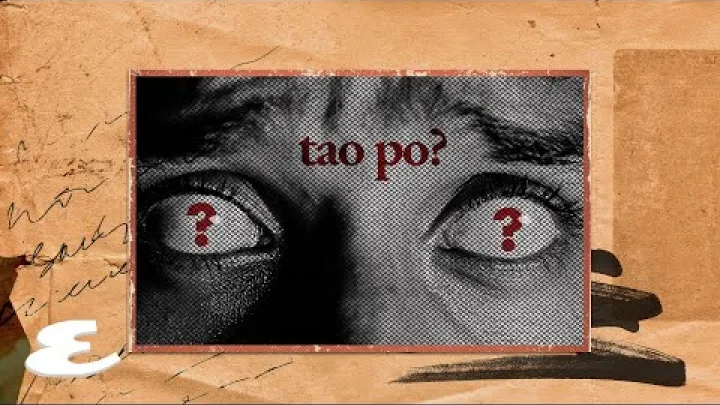Explore the Filipino Superstitions: Beliefs You Didn't Know
Be Wary of What You're Pointing at
In the Philippines, it's considered bad luck to point at things. This includes pointing at people, animals, buildings, and inanimate objects. There are a few different theories as to why this is, but the most popular one is that pointing at things summons evil spirits. It's also impolite to point at things, so it's best to avoid doing it altogether.
Pointing by Your Chin or Lips
This superstition is still practiced today, although it is not as common as it once was. Many Filipinos still believe in it and take care to avoid pointing at people or buildings. If they do need to point at something, they will often use their chin or another part of their body instead of their finger. There are several passed-on theories about the origin, like pointing by your chin is easier and more convenient for busy Filipinos, while some also say that it is safer to point by the chin to avoid provoking elementals.
Avoid Whistling at Night
Whistling can attract ghosts and other supernatural entities, depending on which region you are in. Some believe that whistling at night will also bring about bad financial luck.
The Origins of This Superstition
In Filipino culture, it is believed that whistling at night will attract evil spirits and bad luck. It is also thought that whistling will disturb the souls of the dead who are trying to rest peacefully. This belief is especially strong during All Souls' Day (November 1) and All Saints' Day (November 2). These days are set aside as a time to remember and honor those who have passed away. Whistling during these holidays is considered particularly disrespectful and potentially dangerous.
The Significance of the Superstition
Whistling at night can have more than just spiritual consequences in the Philippines. In some rural areas, whistling is seen as a sign of disrespect because it can be disruptive to people sleeping nearby. Therefore, avoiding whistling after sundown is considered polite and respectful behavior when visiting these areas. Furthermore, loud noises—including whistling—could also attract wild animals or even poachers which could put travelers in danger if they are not careful. The bottom line is that it’s always best for tourists to err on the side of caution when exploring unfamiliar territories by avoiding loud noises like whistles after dark.
Don't Cut a Pregnant Woman's Hair
It is believed that cutting a pregnant woman's hair may cause problems with the baby's health, so it's best to avoid doing this during pregnancy.
The Origin of the Superstition
This superstition originated from traditional Filipino folk beliefs which taught that a pregnant woman should not cut her hair for fear that it would be bad luck for the baby. According to these beliefs, if a pregnant woman were to cut her hair during her pregnancy, she would be cursed with complications during childbirth or even death. It was also believed that cutting a pregnant woman’s hair could cause the baby to be born with an abnormality such as being bald or having birth defects.
Modern Interpretations of this Superstition
Today, most Filipinos no longer adhere strictly to this superstitious belief. However, many still choose not to cut their hair during pregnancy out of respect for tradition and because they believe that it is simply better safe than sorry when it comes to matters concerning their unborn child’s health and well-being. For some Filipinos, this superstitious belief also serves as an act of devotion—a sign of reverence towards the unborn child and faith in its ability to overcome any odds thrown its way.
Continued Practice Despite Skepticism
Despite all the skepticism surrounding this superstition, many Filipinos continue to practice it today as an act of reverence for their unborn children and out of respect for centuries-old traditions. Even those who are more scientifically minded tend to observe this custom due to its cultural importance in Filipino society.
Don't Sweep at Night
Sweeping at night can displace spirits, so it's best to avoid cleaning after dark.
What Sweeping at Night Means for Filipinos
The general explanation for why you shouldn’t sweep at night is that it will carry away all your good luck and fortune. According to tradition, sweeping at night means that you could be sweeping away your wealth, health, or even loved ones. Since these acts are considered bad luck, it’s believed that avoiding them can help protect you from disaster and misfortune.
Where the Belief is Linked
In some cases, this superstition has been linked to the concept of spiritual housekeeping—the idea that after dark is when evil spirits roam freely and can enter your home if you invite them through activities like sweeping or mopping the floors. Thus, avoiding these activities during nighttime helps ward off any negative energy or entities that may try to enter your home while you sleep.
Other Applications
It’s important to note that this belief is not just limited to sweeping but also applies to other household-cleaning tasks such as mopping, washing dishes, and laundry. As such, some people believe that it should be avoided until sunrise when the light can chase away any lingering evil energies or spirits in the home.
Don't Go Directly Home When Attending a Funeral or Wake
It is believed that you may bring the spirit of death home with you, which can cause bad luck. It is best to stop by nearby malls or parks before going home. This deed is called "pagpag" by locals.
The Origin Behind It
The belief behind not going directly home after attending a funeral or wake dates back hundreds of years when Filipinos believed that if you went home immediately after coming from a funeral, death would follow you. It is believed that by avoiding going directly home, the spirit of the deceased will be less likely to follow you and take someone else from your family instead. To avoid any potential harm, it was advised that people go to other places first before returning home from a funeral or wake.
Some Variations of This Belief
Today, there are many variations of this superstition practiced by Filipinos all over the world. Some believe that you should wait until sunset before returning home so as not to bring “bad luck” into your house. Others believe you should wait until morning and make sure to pray before returning home to ward off evil spirits. Still, others believe it’s important to take an alternate route when going back home to avoid running into ghosts or evil spirits along the way. No matter which variation they practice, all Filipinos share one thing in common—they all understand how important it is to respect their ancestors and show them proper respect by following these traditional superstitions.
Avoid Wounds During Holy Week
It is believed that any wounds or injuries suffered during Holy Week will take a long time to heal. So, it's best to be extra careful during this time.
The Origin of the Superstition
The origin of this superstition dates back to when Christianity was first introduced to the Philippines. It was believed that wounds received during Holy Week were particularly painful, with some going as far as to say they would never heal completely. This belief likely originated from the stories about Jesus’ suffering during His crucifixion and death. The thought of experiencing even a fraction of that pain was enough to convince people to avoid getting injured during such an important time in the Christian faith.
Why Filipinos Still Observe This Superstition Today
Today, although medicine has advanced significantly, many Filipinos still observe this superstition out of respect for their cultural traditions and beliefs. Some believe that if you get injured during Holy Week, it will bring bad luck or misfortune upon you and your family throughout the rest of the year. Others simply adhere to it out of habit and tradition; after all, these beliefs have been passed down through generations in Filipino culture.
Avoid Cutting Your Nails at Night
Cutting your nails at night is believed to be bad luck and will make you more susceptible to the evil eye.
The Reasons Behind the Superstition
The most common explanation for this superstition is that cutting your nails at night will bring bad luck or misfortune into your life. It is also believed that if you cut your fingernails after sunset, you will be visited by ghosts or evil spirits during the night. Alternatively, some believe that cutting nails at night invites death into the house.
Scientific Explanations Behind It
Interestingly enough, there are also several scientific explanations behind this superstition. One reason is that nail clipping may contain germs or bacteria which can spread quickly if left overnight in an enclosed space. Additionally, cutting your nails late at night can cause sleep deprivation because of its loud noise, which can make you more prone to accidents or illness due to lack of rest. Finally, cutting nails too close to bedtime can lead to painful hangnails and even infections if not properly treated before sleeping.
The Impact on Filipino Culture
Despite these various explanations, superstitions such as avoiding cutting your nails at night have become deeply ingrained in Filipino culture and tradition over time. As such, they have come to represent a larger cultural identity—one rooted in respect for ancestral beliefs and traditions. Respectful acknowledgment of these customs demonstrates recognition of their historical importance and value within the community. Furthermore, following these superstitions fosters a sense of solidarity among Filipinos living both within and outside the country—it serves as a reminder that even though we may live far apart from each other geographically, we are still connected by our shared heritage and values.
Avoid Stepping Over a Child
Stepping over a child is seen as disrespectful and is said to impede his or her growth. There is also a belief that if you did step over someone, it is important to step back over them again, to cancel it out.
Meaning Behind the Superstition
At its core, this belief centers around cherishing children in Filipino culture and respecting them as much as possible. It’s believed that by not stepping over a child, you are protecting them from negative energy or potential harm they may face in life. The belief also suggests that if someone steps over a child, they will bring bad luck upon themselves or even stunt the growth of the child they stepped over.
How Should I Handle the Situation?
As a sign of respect for Filipino culture, it is important to adhere to this belief when visiting the country. If you find yourself in a situation where you need to step over a child, try your best not to do so—even if it means taking an alternate route or asking someone else for help. It may also be beneficial for tourists visiting the Philippines to inform their hosts or guides of this cultural belief before arriving at their destination—that way, they can take extra precautions when traveling with children around them.
When You Are Lost, Turn Your Clothes Inside-Out
If you're lost, it could be that the elves or any supernatural beings are playing with you.
What Does It Mean?
This superstition is rooted in the belief that it will bring a person luck and will help them get back to safety. Turning your clothes inside-out is believed to confuse the evil spirits who were responsible for leading the person astray in the first place. It's believed that these spirits won't be able to recognize the person once their clothing has been reversed, which keeps them from leading the person further away from their destination.
Potential Benefits
This superstition holds a certain appeal for many people as it offers an easy solution to getting lost—all one needs to do is turn their clothes inside-out and they will eventually find their way back home! Furthermore, some people believe that it can be used as a signal for help—by turning their clothing inside-out someone may be able to catch the attention of passersby who will then offer assistance in finding one’s way back home.
Saying Tabi-Tabi Po
When passing by unfamiliar, secluded places, it is customary to say “Tabi-tabi po” to let any unseen entities know that you are not there to cause any harm.
What is Tabi-Tabi Po?
The term “tabi-tabi po” literally translates to “please step aside, please”, and it is used as a polite way of asking for permission before entering a space that might be occupied by unseen entities. This superstition dates back centuries, and travelers would use this phrase when passing by unfamiliar or secluded places to avoid disturbing any spirits that may be present. This belief was also shared by other Asian cultures like Japan, where similar phrases are still used today.
Why Do People Believe In Tabi-Tabi Po?
This superstition has been around for centuries and has been passed down through generations in Filipino culture. The belief behind tabi-tabi po stems from the idea that all living things have spirits, including animals and plants. Filipino folklore also states that there are certain places where these spirits reside, so people will say tabi-tabi po when entering or passing through those areas as a sign of respect for those spirits.
Why It Is Important
In today’s world, most people don’t believe in superstitions or spirits. However, tabi-tabi po is still widely used in Filipino culture as a way of showing respect for the unknown. It also serves as an important reminder to be mindful of our actions and think twice before entering unfamiliar places or trespassing on someone else's property. Respect for nature, ancestors, and spiritual beings is something deeply rooted in Filipino culture, which explains why this superstition has been passed down for generations despite the modern age.
Honorable Mentions
Here are some other well-known superstitions that are still prevalent in Filipino culture.
Jump During New Year
Jumping on New Year's Eve is said to make you grow taller. So, if you want to grow more, jump as high as you can at the stroke of midnight when celebrating New Year!
Placing a Chick on Top of a Coffin
At the funerals of murder victims, a chick is placed on top of the coffin to 'peck away at the perpetrator's conscience.'
Itchy Palms Means Money
If your palms are itchy, it is believed that you will soon receive money or blessings are on their way.
Accidentally Biting Your Tongue
It is believed that when you accidentally bit your tongue, someone is talking about you. It could be your friend, family members, or even your crush.
Rotating Your Plate When Someone Leaves
If you are having a meal with your family and one of you has to leave right away, you must spin your plates 360 degrees. It is believed to avoid accidents or bad luck happening.
Don't Sleep with Wet Hair
It is believed that sleeping while hair is wet can cause sickness- more specifically mental illnesses, so it's best to avoid sleeping with wet hair. In some regions, doing this may also result in blindness.
Avoid Taking Pictures of Three
It is believed that when taking a picture with only three people in it, the one in the middle will die first.
Don't Open an Umbrella Inside a House
Opening an umbrella inside a house is considered bad luck, so it should be done outside or in another area.
Prepare A Lot of Coins With You During New Year's Eve
It is believed that having a lot of coins with you during new year's will bring wealth in the upcoming year. What attracts more luck is the sound of the clanking and jingling of coins.
Conclusion
These superstitions have been around for many years and are still observed in Filipino culture today. Whether you believe in them or not is up to you, but it's interesting to learn about the beliefs that are held by so many people!
Your Nearby Location
Your Favorite
Post content
All posting is Free of charge and registration is Not required.











